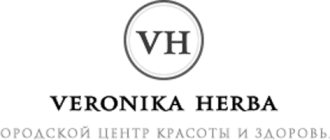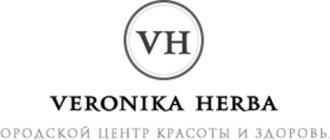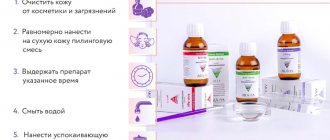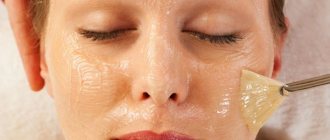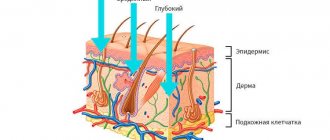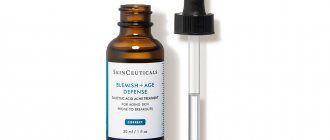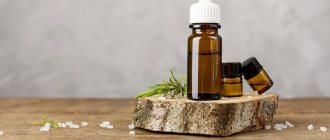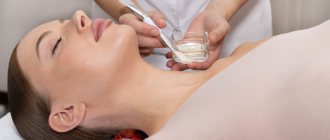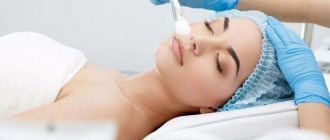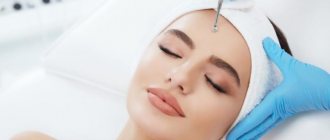From this article you will learn:
- Features of the facial peeling procedure
- Types of peelings for facial skin
- Chemical peeling for face
- Mechanical facial peeling
- Ultrasonic facial peeling
- Laser facial peeling
- Choosing the type of facial peeling based on age and skin type
Despite the large number of types of facial peels in cosmetology, they have similar tasks. Each helps cleanse and rejuvenate the skin. Depending on the depth of penetration, the substances included in the peels remove dead cells, stimulating regeneration.
The effectiveness of the procedure is also determined by the method of exposure. Some peels mechanically remove dead skin cells, while others dissolve them chemically. We will talk about the intricacies of using various types of peelings for the face and décolleté in this article.
Features of the facial peeling procedure
Translated from English, the word “peeling” means “to wash”, “to clean”. Therefore, this event is intended to deeply cleanse the facial skin, remove sebum and impurities, and eliminate dead cells from the surface of the skin.
After exfoliation of the stratum corneum, a renewed, fresh layer of epidermis appears. Young skin better absorbs oxygen and moisture, which normalizes metabolic processes, increases resistance to external negative factors, and improves cell nutrition.
There is an opinion that peeling is just a rejuvenating procedure. However, there are different types of facial peels that have their own characteristics. The basis for its implementation depends on the specifics of a particular procedure. General indications include:
- sagging and sagging skin;
- excessive pigmentation;
- the presence of a thick keratinized upper layer of the epidermis;
- consequences of acne.
Thanks to cleansing, age-related changes become less pronounced. Skin regeneration helps reduce deep or expression wrinkles. Peeling allows you to restore the structure of the skin layer, eliminating defects (microscars, age spots, various scars). In addition, during the procedure, the sebaceous glands and pores are cleansed, it serves as a prevention of inflammatory processes and acne.
Cleaning is not contraindicated for any skin type (dry, normal, oily).
Peeling is a fairly traumatic procedure, so it has a number of limitations:
- overly sensitive skin;
- presence of damage (wounds and abrasions on the face);
- age less than 18 years;
- acute stage of acne or herpes infection;
- pregnancy, lactation;
- tendency to allergies.
Peeling allows you to eliminate various defects and helps maintain healthy, fresh skin. The necessary conditions are the supervision of a professional and the implementation of all recommendations.
Contraindications
Do not peel at home if you have:
- severe inflammation of the skin, furunculosis;
- herpetic rashes;
- tendency to food or drug allergies;
- high sensitivity of the skin;
- open wounds and scratches;
- malignant neoplasms at the treatment site;
- rosacea;
- chronic dermatological pathologies.
Also, you should not peel too often during pregnancy and lactation.
Types of peelings for facial skin
An experienced specialist will help you determine which type of facial peel to choose. The effect of the procedure depends on the depth of exposure of the drugs. The cosmetologist will assess the condition of the skin, the specifics of existing problems and recommend the most suitable option.
Name and description of the main types of facial peeling:
- Superficial peeling. The procedure involves cleaning only the upper layers of the epidermis, without affecting the living layers. The process of superficial peeling removes dead cells. There are practically no contraindications to this procedure, it is painless and does not cause complications.
- Medium peeling. Involves cleaning the entire skin layer. During the session, drugs penetrate deeper into the epidermis, which has a beneficial effect on metabolic processes. Medium peeling is performed only by a professional cosmetologist. After such manipulations, the skin needs intensive restoration.
This type of facial peeling in cosmetology is intended for rejuvenation. It helps eliminate large areas of pigmentation, reduce deep wrinkles, and get rid of old spots. After the procedure, minor burns and red marks remain, so the recovery period can be 3–4 days.
- Deep peeling. Quite a complicated procedure. All manipulations are performed only in a hospital setting with mandatory pain relief. In the process, all layers of the epidermis are destroyed. Tissues begin to regenerate from the remaining fragments.
Deep peeling (laser and chemical) is an aggressive cleaning method. This procedure immediately rejuvenates by 8–10 years, due to the almost complete burning of old skin and its replacement with new one.
The most common anti-aging procedure is medium peeling.
In order to refresh the skin, superficial cleaning is performed at least 2 times a month. To eliminate defects and prevent early age-related changes, medium peeling is performed twice a year.
Indications for deep peeling must be very serious.
There are the following types of peelings for cleansing the skin:
- chemical;
- mechanical;
- ultrasonic;
- laser.
Let's look at each type in more detail.
Recovery period
The more the skin is damaged, the longer it takes to recover. When concentrated acids are used during chemical peeling, tissues are severely damaged, but thanks to such deep damage, it is possible to get rid of many imperfections, including post-acne and hyperpigmentation. In the first 2 weeks after the procedure, active peeling of the skin occurs. The cosmetologist prescribes regenerating and anti-inflammatory drugs.
If deep phenol peeling is carried out, then for three days after it any contact with water is prohibited. Drinking is only allowed through a straw. You can wash your face only after the red skin is covered with a fibrin coating, which indicates the beginning of the recovery process. It can take more than 2 months.
But classic acid peels, which affect the superficial layers of the epidermis, do not require such a long recovery. For the first 5-7 days, the skin may remain hyperemic and inflamed. During this period, visits to baths, saunas, and sunbathing are prohibited. You should also avoid sports training, intense physical activity, and visiting the pool.
Recovery after facial cleansing takes several days. After mechanical cleansing, the face may remain red for 2-3 hours. During this period, you should not wash your face with water, use cosmetics, sunbathe, or go to the bathhouse. Ultrasonic facial cleansing takes place without discomfort and does not require long-term recovery.
Chemical peeling for face
- Superficial peeling
The procedure is carried out using fruit alpha-hydroxy acids (glycolic, lactic, citric, grape). Under the influence of chemicals applied to the surface of the skin, the keratinized cells of the epidermis dissolve. These drugs not only cleanse and activate skin tissue. They have the following positive properties:
- moisturize;
- relieve inflammation;
- normalize the functions of the sebaceous glands;
- tighten pores;
- disinfected.
Indications for the procedure are hyperkeratosis, acne, post-acne, oily skin, enlarged pores, signs of early age-related changes (minor pigmentation, shallow wrinkles).
To get a lasting effect, at least 10–15 sessions are needed. The frequency should be once a week.
- Medium peeling
This type of chemical peeling for the face in cosmetology involves treating the skin with trichloroacetic acid (25–30%) and salicylic acid (30%). The action of these substances is to dissolve the cell layers to the depth of the papillary layer. The skin's response to chemical irritation is swelling and redness. Skin tissue is restored within 7 days, during which the dead layer of cells peels off.
Recommended articles on the topic:
- How to increase skin elasticity: vitamins, exercises, creams and salon treatments
- How to remove wrinkles on the face: the most effective methods
- Microcurrent facial therapy is a beneficial treatment for your skin
Using medium peeling, age-related changes in the skin (wrinkles, age spots, decreased tone) are eliminated. In addition, chemicals have anti-inflammatory and disinfectant effects. Medium chemical peeling is effective in the complex treatment of acne, as it normalizes the function of the sebaceous glands. Another advantage of this type of acid peeling for the face is its ability to cope with scars and stretch marks.
- Deep peeling
As a rule, this procedure involves the use of drugs that contain phenol. The substance affects the deep layers of the epidermis down to the middle layer. The effect is a significant renewal of the skin. Most often, men and women after 40 years of age undergo phenol peeling to correct pronounced age-related skin changes.
The basis for this procedure is the presence of:
- wrinkles, nasolabial and eyebrow folds, creases in the lips and eyes;
- excessive pigmentation;
- sagging, sagging skin;
- scars, scars, stretch marks;
- photoaging process.
The rehabilitation period after deep peeling lasts at least 4–6 weeks. To avoid complications, patients should strictly adhere to all medical recommendations regarding preparation for peeling and skin care after the session. At the end of the rehabilitation period, the face looks approximately 10 years younger. After one procedure, the result lasts for several years.
Contraindications to phenol peeling are severe heart and vascular diseases, liver and kidney diseases.
Mechanical facial peeling
This type of manual peeling is considered the easiest way to cleanse the face. The procedure involves mechanical removal of the top layer of the epidermis using abrasives. The preparations used contain hard granules to quickly eliminate dead cells. Such means include:
- Scrub. Available in the form of a gel or cream with abrasive particles. The product is applied to the face, after which it is washed off along with dead cells. It is important to try not to injure the skin during the scrubbing process.
- Gommage. Designed for cellular nutrition and regeneration. The product is a rolling cream with soft abrasive particles or fruit acids that dissolve during cleaning.
- Brushing (brossage) to exfoliate the dead layer of the epidermis. To perform the procedure, you need a special hard brush with synthetic bristles. The face is covered with abrasive paste, then massaged with a brush.
- Salt peeling. The procedure is performed using products containing table or sea salt, rich in macro- and microelements.
- Coral polishing. The products used during the procedure contain coral chips and plant components.
- Film masks for removing dead cells from the skin. The product is a special silicone film that is applied to the face and then removed along with the stratum corneum.
With the help of manual mechanical cleaning, impurities are removed from the surface layer, the skin becomes fresh, and shallow wrinkles are smoothed out.
We recommend
Laser aesthetic cosmetology: the perfect technique for an ideal appearance More
In the beauty salon, specialists perform medium mechanical peeling, which includes microcrystalline dermabrasion and diamond exfoliation. Using these procedures, minor scars, scars, slight pigmentation, and post-acne are eliminated.
Patient reviews
Women often leave opinions about different types of peels for dry skin. For example, the author of this review praises drugs based on lactic acid.
Another girl believes that milk peels are good not only for salon use, but also for home use. The main thing is to choose the right tool.
There are reviews regarding specific products. For example, here we are talking about Gentle Peeling produced by Natura Siberica. A girl suffering from dry skin praises the drug, which turned out to be especially useful for her in the winter.
The author of this review has dry, sensitive skin with wrinkles, which reacts to changes in humidity in the room and on the street. On the advice of a cosmetologist, the girl did peeling with fruit acids, but was dissatisfied with it.
Dry and especially sensitive skin requires special care. Not every peel will suit her. Before the procedure, you must do a sensitivity test so as not to provoke an allergy.
You should start with the softest, most delicate means and procedures. Thanks to the right cleansing method, your skin will be smooth, even, and radiant. Only you will know that it is dry.
Ultrasonic facial peeling
This type of peeling refers to hardware procedures for surface cleaning, which involves removing dead cells and cleansing contaminated pores.
Opinion of cosmetologists
Not all doctors call peeling a suitable procedure for dry facial skin, noting that after this the epidermis may experience an even greater moisture deficiency. Therefore, it is important for women who decide to cleanse their face to consult with an experienced specialist. For example, this cosmetologist does not consider brossage to be a gentle technique.
It is necessary that the doctor not only select the optimal type of peeling taking into account your skin type, but also talk about all the nuances of the procedure, including possible contraindications and complications. The author who expressed this opinion is counseling a young mother who has recently completed her lactation period.
Laser facial peeling
This type of peeling involves exposing the epidermis to a laser beam. Depending on the type of radiation, as well as the depth of laser penetration, one or another result is achieved.
Contraindications to this type of facial peeling in cosmetology for problem skin:
- oncological diseases;
- cardiovascular diseases;
- infections;
- pregnancy;
- impaired blood clotting;
- presence of fillers in the treated area;
- connective tissue diseases, autoimmune diseases.
Peeling helps in solving a variety of aesthetic problems. To achieve maximum effect, you need to focus on your skin type. In addition, it is important to strictly adhere to the technology of performing the procedure.
Choosing the type of facial peeling based on age and skin type
When choosing the type of superficial (or other) facial peeling in cosmetology, it is customary to take into account two important factors: the age of the client and the specifics of the problem.
Depending on the degree of skin aging, the optimal type of cleansing is selected:
- 21–25 years old. At this age there are no significant changes yet. Only pigmentation may appear. Experts recommend gommage or scrubbing, enzyme cleansing, and peeling using fruit acids.
- 25–35 years old. This period is characterized by the appearance of facial wrinkles, keratosis, and age spots. Cosmetologists recommend cryopilling, laser or superficial chemical peeling.
- 35–50 years old. At this age, changes in the condition of the skin become clearly visible: dull complexion, pronounced pigmentation, capillary network. Laser cleaning and vacuum peeling are recommended.
- More than 50 years. This period is characterized by the presence of many wrinkles and creases of varying depths. After 50 years, the skin needs deep chemical peeling and laser cleaning.
For mature facial skin after 40 years, cosmetologists recommend dermabrasion, mid-level professional laser or ultrasonic peeling.
- For oily skin, diamond peeling, coral mechanical or dry cleansing is suitable.
- For problem skin, salicylic or almond peels are performed.
Cosmetologists consider peelings to be an effective remedy that helps maintain skin health and renew it. Thanks to the procedure, skin tissue rejuvenation occurs quickly, skin tone increases, wrinkles are smoothed out.
If you perform peelings regularly, there will be no need for plastic surgery to restore and rejuvenate the skin.
The downside of these procedures is the risk of complications in the form of intense pigmentation, spider veins, and tissue scarring in the area of severely damaged or burned skin.
To avoid unforeseen consequences during cleansing or restoration, you need to contact trusted beauty salons. In addition, it is necessary to choose only high-quality drugs.
Why clients choose Veronika Herba Beauty and Health Center:
- This is a beauty center where you can take care of yourself at a reasonable cost, while your face and/or body will be treated not by an ordinary cosmetologist, but by one of the best cosmetologists in Moscow. This is a completely different, higher level of service!
- You can receive qualified help at any time convenient for you. The beauty center is open from 9:00 to 21:00, seven days a week. The main thing is to agree with your doctor in advance on the date and time of your appointment.
Sign up for a consultation with a specialist by phone +7 (495) 085-15-13
, and you will see for yourself!
